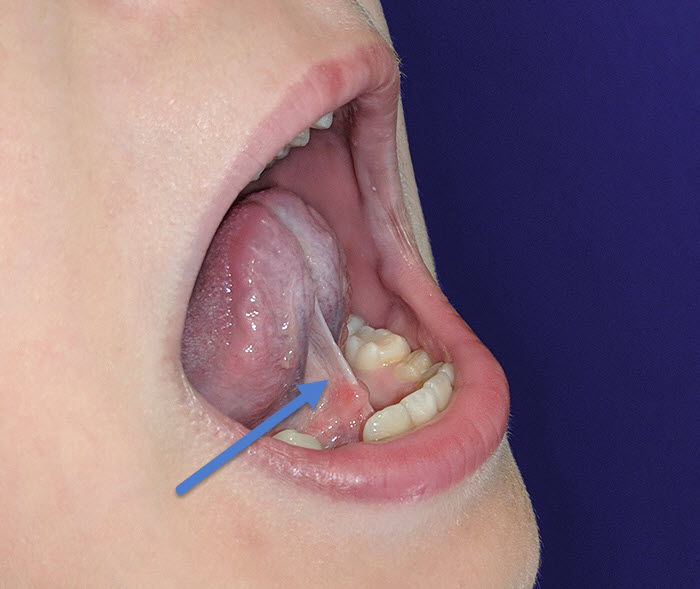Should I Cut My Child’s Tongue Tie?

A very hot topic of debate in the field of speech-language pathology, is the issue of tongue tie clipping. Some professionals (dentists and medical doctors) are still recommending that children with speech delays have their tongue tie clipped to ostensibly help their speech improve. Sometimes parents of infants are told to clip a tongue tie so that their child will not have potential speech difficulties in the future. On the other side of the argument are the professionals who see no correlation between a tongue tie and speech delays. What to do if you are a parent of a child with a tongue tie?
Here is one perspective from a speech-language pathologist…
What is a Tongue Tie?
First of all, what is a tongue tie? A tongue tie refers to a shorter than average lingual frenulum (the tissue that connects part of the tongue to the floor of the mouth).
Ankyloglossia, is the official term for a tongue tie. Some professionals believe that a tongue tie will result in speech delays due to the shorter range of motion possible for the tongue. Due to this assumption, there are some dentists and doctors who perform a surgical procedure called frenotomy, commonly known as tongue tie clipping. At one time, tongue tie clippings were performed quite frequently. However research started to challenge the efficacy of this procedure as early as 1941. Since that time, the procedure has dropped off in frequency, but interestingly, it is still being recommended by some medical professionals as a solution to remediate speech delays to this present day (2019).

To Cut or Not to Cut the Tongue Tie?
As I mentioned, this is a hot topic of debate, with highly educated professionals on opposing sides of the issue: to cut or not to cut the tongue tie. The professionals who argue against the procedure are often looking at it from a scientific perspective: the research does not seem to support a link between tongue ties and speech delays. Here is a summary of some of that research to date:
One of the earliest studies I could find investigating the possible connection between a tongue tie and speech delays was conducted by McEnery and Gaines (1941). They did a study of 1000 patients with speech disorders and identified only 4 individuals with a tongue tie. In all 4 cases, the individuals with a tongue tie corrected their speech errors after speech therapy. These researchers concluded that tongue tie clipping was not recommended due to the resulting possibility of hemorrhages, infections, and scar tissue and because of the lack of connection between a tongue tie and speech disorder.
In the American Speech-Language-Hearing Association (ASHA) Leader (Dec. 2005) A. Kummer concludes the following: “There is virtually no evidence in the literature to establish a definite causal relationship between ankyloglossia [tongue tie] and speech disorders.” In fact, this article lists several studies which have been conducted and were unable to find a causal relationship between speech delays and tongue ties (Wallace, 1963; Block 1968; Catlin & De Haan, 1971; Wright, 1995; Agarwal & Raina, 2003).
The National Center for Biotechnology Information (NCBI) published a thorough review of the research on Treatments for Ankyloglossia and concluded, “the evidence for the effect of surgical interventions to improve speech and articulation to be insufficient”.
In the Canadian Medical Association Journal, an article by Dr. K.S. Joseph et al, (January 26, 2016) concluded that frenotomy (tongue tie clipping) to be an “unnecessary surgical procedure among infants”. And finally, in 2015, the Canadian Paediatric Society recommends treatment [frenotomy] “only if it interferes with breastfeeding”.
There seems to be a lack of empirical support linking a tongue tie to a speech delay. Let’s look at this question from a physiological standpoint.
A Tongue Tie Rarely Limits Articulation
There is a common belief that in order to make all the sounds for speech, the tongue must have a wide range of mobility. This is not actually the case. Despite having a short or very tight frenulum, an individual can make all the sounds necessary for speech. The following sounds are made by the tip of the tongue touching or just slightly behind the front teeth: /t/ as in toy, /d/ as in dog, /n/ as in nose, /s/ as in sock, /z/ as in zebra, /l/ as in lion, “th” as in thumb, “sh” as in shoe, “ch” as in cherry and “j” as in juice. These sounds require minimal movement for the tongue tip. Some remaining speech sounds such as: /k/, /g/, /r/, (and all vowels) are unaffected by a tongue tie since we produce these sounds with the back of the tongue.
Unfortunately, some parents of tongue-tied children are told by some professionals that their child has an articulation delay BECAUSE of the tongue tie. We have already reviewed the research and can conclude that this belief is not supported empirically. Many children have articulation delays; yet only a tiny subset of these children have a tongue tie (an estimated 0.4%). In some cases, children with an articulation delay will develop the sounds accurately just with maturation. In other cases, the child receives speech therapy to correct the articulation in a relatively short period of time.
As a speech-language pathologist working in private practice, I often get calls from parents of preschool children (2-3 yrs old), who are on the waitlist for publicly funded services, as they are not meeting their speech and language milestones. At times, these parents will tell me that their child is scheduled to have their tongue tie clipped. When I ask the parent if the child is speaking at all, the parent tells me the list of words which the child is already saying and that list often includes words which require the tongue tip to articulate (e.g., words with: /t/, /d/, /n/, /l/ etc). The procedure should not be recommended for children who are already demonstrating proficient articulation of sounds which require tongue tip placement.
A speech assessment with a speech-language pathologist (SLP) may be a prudent course of action prior to scheduling surgery to clip a tongue tie for reasons of speech delay. An SLP will evaluate whether or not the tongue tie is impacting the ease of accurate articulation, or contributing to distortions of specific sounds; thereby, offering validation for the procedure. If on the other hand, the SLP notes that the child is physically capable of achieving tongue placement for all sounds, that family will have avoided an unnecessary surgical procedure for their child.
Why Are Tongue Clipping Procedures Still Being Performed?
Despite a lack of empirical evidence to support the correlation between a tongue tie and speech delay, some doctors and dentists are still recommending this procedure to individuals as young as newborns and as old as adolescents for ostensibly preventing or remediating speech delays.
I believe that this procedure persists due to the parents and professionals who are reporting anecdotally that they saw improvement in their child’s speech after a tongue clipping procedure. These may not be “scientific” controlled studies or cases; however, we cannot discredit these parents’ reports.
The procedure of tongue clipping is a fairly minor surgical procedure, so if there are parents who see an improvement after the procedure (regardless of whether it is supported empirically or not), perhaps that is why this procedure persists?
Of course, there are also parent reports which are unfortunately the opposite: that is, parents who have had their child’s tongue clipped, who fail to see any change in their child’s speech. Although it is a minor surgical procedure when performed on infants, the older a child is, the more likely a general anesthesia is required. Furthermore, many of these children who could be receiving speech therapy to efficiently fix their articulation errors are in a holding pattern waiting for a surgical procedure which has been promised to be the solution for their child’s speech problems. In some extreme cases, parents have been advised to reclip the tongue up to 9 times, as the frenulum is known to reattach itself. All these delays are disappointing for the parent and the child as they follow the medical advice only to see no change in their child’s speech delay.
As a practicing speech-language pathologist for more than 19 years, I can share my anecdotal experience with tongue ties and speech delays as follows:
- many children I see with tongue ties do not have a speech delay
- many children with speech delays are not tongue tied
- children with speech delays who happen to have a tongue tie progress in therapy just as quickly as those who are not tongue tied
Sometimes the simplest solution is often the best: If a child has a speech delay, the best course of action is speech therapy.
*Note: This blog was authored by a speech-language pathologist and addresses the issue of tongue clipping in relation to speech delays only. Tongue clipping can also be recommended for infants who are tongue tied and who are experiencing difficulties with latching while breastfeeding. That is a completely separate issue. Lactation consultants and medical doctors are qualified to speak to the efficacy of tongue clipping in relation to tongue ties and breast feeding.
